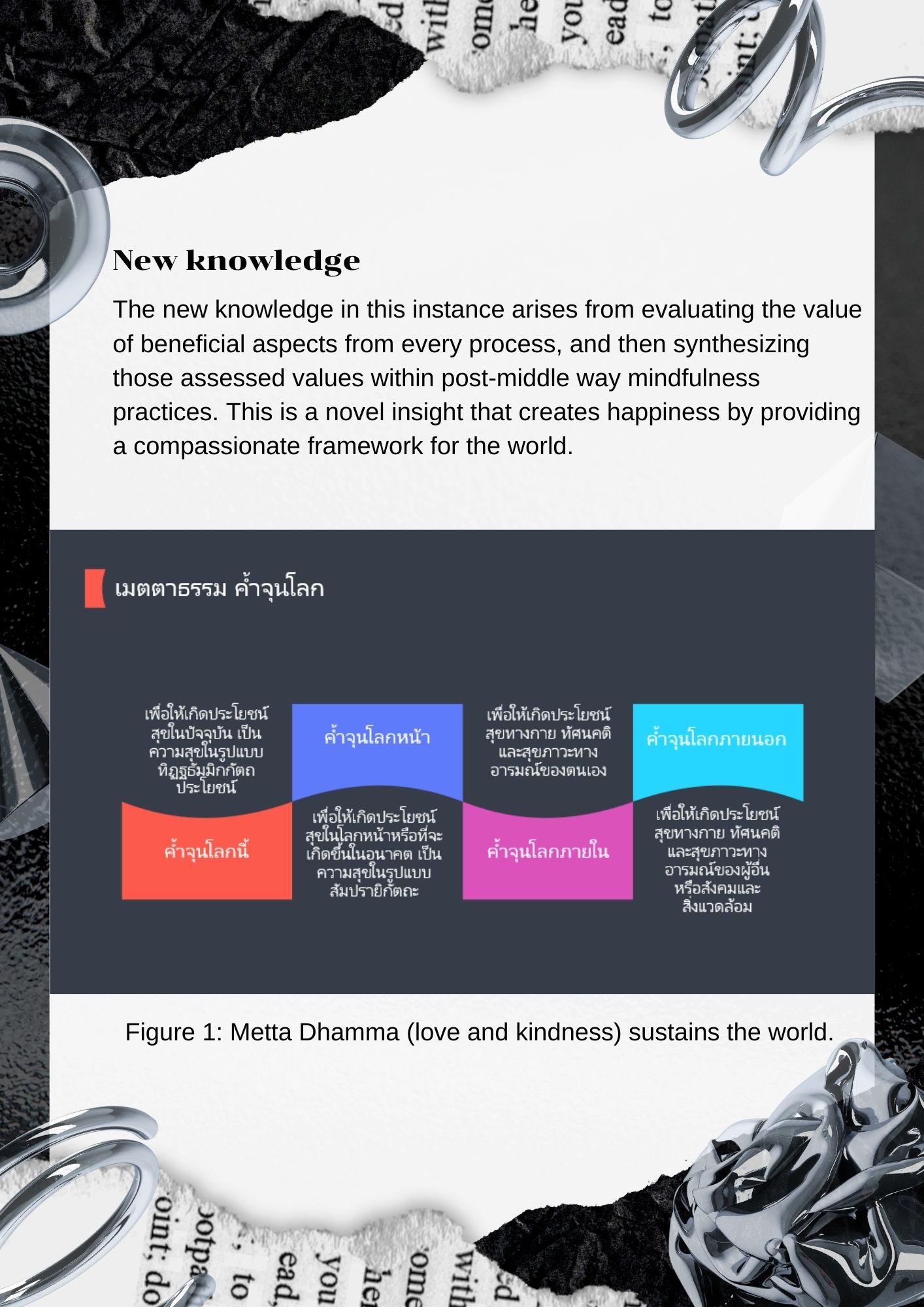Loving Kindness Sustain The World
Keywords:
Mettadham, Loving Kindness, Sustain The WorldAbstract
This academic article aims to study and analyze how loving kindness supports the world, utilizing the moderate post modern philosophy as a foundation for interpreting Buddhist principles. This analysis aims to promote a deeper understanding of Buddhist principles, particularly emphasizing Metta (loving-kindness) for the development of a happy, peaceful, serene, and beneficial life for all. The study finds that compassion, devoid of attachment, is a benevolent intention arising from a generous mind, desiring happiness for oneself and others, constituting the quality of happiness based on wisdom. It involves acts of generosity, assistance, sharing, broad-mindedness, gentleness, and providing a safe space for relational interactions. Compassion entails understanding without prejudice or emotional bias. Loving kindness is a moral virtue capable of supporting the world, as stated in Buddhist scriptures: “Loving Kindness Sustain The World” This suggests that when people on Earth cultivate love and compassion, they naturally refrain from thoughts of harming or destroying others but rather think to support and assist one another. Conflicts arising from division, competition, harm, and war are less likely to occur. However, individuals lacking compassion, despite possessing wisdom, are prone to harming themselves and others, including loved ones such as parents or benefactors. Conversely, compassionate individuals refrain from harming or injuring others physically or emotionally, refraining from stealing or causing agitation. Loving kindness avoids deception, maintaining mental clarity. Therefore, compassion is a support system for the world, preventing disasters, wars, excessive suffering, and fostering peace and tranquility. The more compassion exists within the minds of people, the closer the world approaches peace and usefulness. It also serves as a moral virtue leading to ultimate tranquility and promotes the alleviation of all suffering.
References
กีรติ บุญเจือ. (2545). เริ่มรู้จักปรัชญา (ชุดปรัชญาและศาสนาเซนต์จอห์น เล่มต้น). กรุงเทพฯ : สำนักพิมพ์ มหาวิทยาลัยเซนต์จอห์น.
พระกิตติพงษ์ อาภาธโร (ไลไธสงค์), สมเดช นามเกตุ, พระครูจิรธรรมธัช. (2564). การประยุกต์ใช้หลักเมตตาธรรมเพื่อลดความรุนแรงในชุมชนบ้านสร้างก่อ ตําบลสร้างก่อ อําเภอกุดจับ จังหวัดอุดรธานี. วารสารปัญญาปณิธาน, 6(1), 201-214.
พระครูสมุห์วัยวุฒิ ชิตจิตฺโต, พระมหาดวงเด่น ฐิตญาโณ, และบรรพต ต้นธีรวงศ. การประยุกต์หลักเมตตาในพระพุทธศาสนาเถรวาทเพื่อจัดการความขัดแย้ง. วารสารสันติศึกษาปริทัศน์ มจร., ฉบับพิเศษ , 150-161.
พระคันธสาราภิวงศ์. (2547) เมตตาภาวนา. กรุงเทพฯ : พิมพ์อำไพ.
พระมหาบุญเรียน ปภงฺกโร (พิลาพันธ์). (2556). วิเคราะห์แนวความคิดเรื่องเมตตาในพุทธปรัชญาเถรวาท. วิทยานิพนธ์พุทธศาสตรมหาบัณฑิต. พระนครศรีอยุธยา : มหาวิทยาลัยมหาจุฬาลงกรณราชวิทยาลัย.
พีระวัฒน์ ฉัตรไทยแสง และ เชษฐ์นิติภัทร พรหมชิน. (2566). เมตตาพรหมวิหารธรรมสร้างสันติสุขให้สังคม. วารสารธรรมเพื่อชีวิต, 29(1), 111-124.
เมธา หริมเทพาธิป, รวิช ตาแก้ว และคณะ. (2564). “สังคมแห่งการแบ่งปันตามหลักปรัชญาของเศรษฐกิจพอเพียง : การศึกษาเชิงวิเคราะห์ วิจักษ์ และวิธาน”. รายงานการวิจัย. กรุงเทพฯ : ศปป. 5 กอ.รมน. และ มหาวิทยาลัยราชภัฏสวนสุนันทา.
เมธา หริมเทพาธิป. (2561). การมีส่วนร่วมในมุมมองหลังนวยุค. รมยสาร, 16(3), 63-77.
สมเด็จพระมหาสมณเจ้ากรมพระยาวชิรญาณวโรรส. (2535). พุทธศาสนสุภาษิตเล่ม 1. (พิมพ์ครั้งที่ 2). กรุงเทพฯ, โรงพิมพ์เลี่ยงเซียงจงเจริญ.
Best, S. and Kellner, D. (1999). Postmodern Theory. New York : The Guilford Press.

Downloads
Published
How to Cite
Issue
Section
License
Copyright (c) 2024 Institute of Sufficiency Journal

This work is licensed under a Creative Commons Attribution-NonCommercial-NoDerivatives 4.0 International License.



